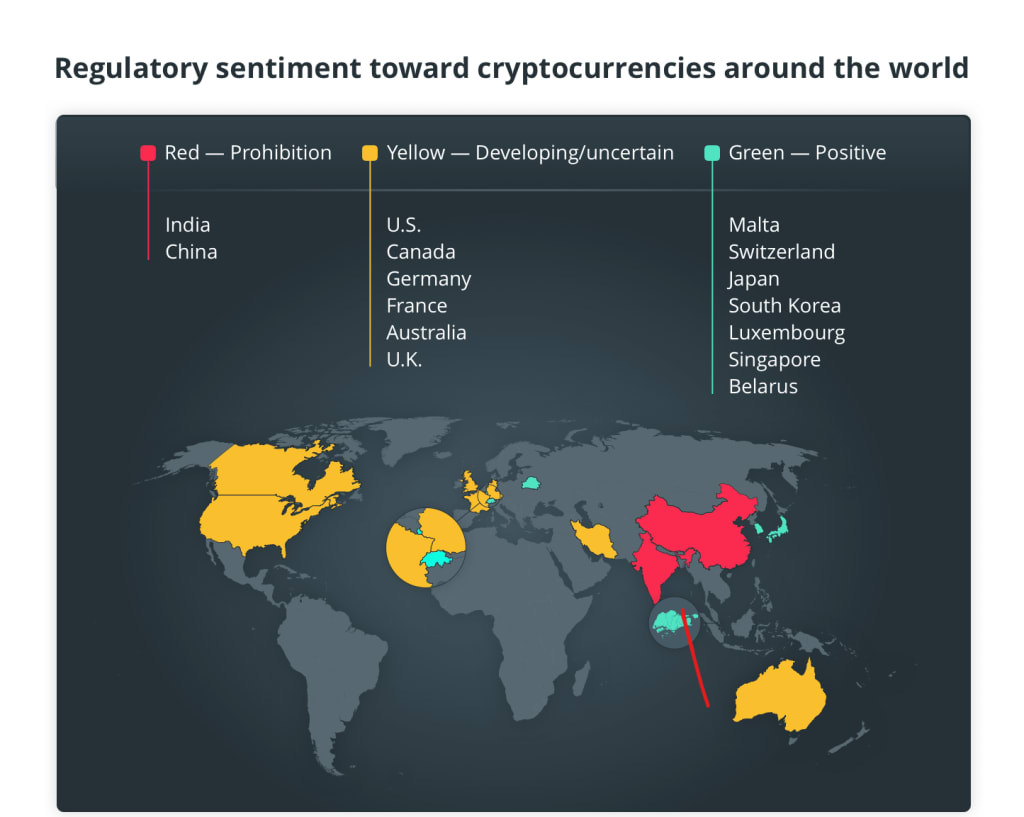CRYPTOCURRENCY REGULATION AND ITS GLOBAL IMPACT
CRYPTOCURRENCY

As digital currencies continue to grow in popularity and cause disruption in established financial systems, cryptocurrency regulation has become a key subject of discussion and controversy. We shall examine the key ideas surrounding bitcoin legislation and its global implications in this summary.
INTRODUCTION
Digital assets called cryptocurrencies, like Bitcoin and Ethereum, use cryptographic technology to provide secure transactions and decentralized management. They provide advantages including immutability, transparency, and possible financial inclusion. However, the lack of a centralized authority and their decentralized structure make regulation and oversight difficult.

Regulatory Approaches in cryptocurrency
Globally, regulatory approaches to cryptocurrencies differ. Some countries have embraced cryptocurrencies and blockchain technology in order to stimulate innovation while creating clear guidelines. Others have highlighted worries about potential hazards like as money laundering, fraud, and market manipulation. Regulatory measures often focus on anti-money laundering (AML), know-your-customer (KYC) standards, taxation, and consumer protection.

Regional Perspectives
North America: The country has adopted a mixed strategy, with the Securities and Exchange Commission (SEC) and other regulatory authorities establishing rules on initial coin offerings (ICOs) and classifying some cryptocurrencies as securities. Regulatory frameworks have also been put in place in Canada, including licencing requirements for bitcoin exchanges.
Europe: A number of European nations have put in place legal frameworks for cryptocurrencies, some of which make a distinction between utility tokens and security tokens. A thorough regulatory framework has been developed by the European Union to manage the hazards related to cryptocurrencies.
Asia: AML and KYC regulations for exchanges, as well as proactive moves to regulate cryptocurrencies, have been implemented in nations like Japan and South Korea. On the other hand, China has implemented tougher laws that forbid initial coin offerings and cryptocurrency exchanges.
Emerging Markets: Cryptocurrencies can offer chances for financial inclusion in nations with shaky economies or restricted access to conventional financial services. However, these marketplaces frequently lack distinct regulatory structures, which can present risks and difficulties.

Impact on Financial Systems
Innovation and disruption: By enabling quicker, less expensive, and more inclusive transactions, cryptocurrencies have the potential to upend established financial systems. Cryptocurrencies' underlying blockchain technology has the potential to revolutionise industries including remittances, cross-border payments, and supply chain management by increasing transparency and reducing the need for middlemen.
Financial Stability: The volatility of cryptocurrencies and the possibility for speculative trading raise questions about the stability of the financial system. Regulatory controls strive to safeguard investors and reduce risks while maintaining the stability of the larger financial system.
Central bank digital currencies (CBDCs): which are digital currencies produced and governed by central banks, are being investigated by some nations. CBDCs seek to bring together the advantages of cryptocurrencies with the security and regulation offered by conventional fiat currencies.

Global Cooperation and Challenges
Effective cryptocurrency regulation requires global cooperation and collaboration. Guidelines for AML and counter-terrorism financing measures have been released by organisations like the Financial Action Task Force (FATF). Harmonized regulation is hampered by issues like jurisdictional conflicts, diverse regulatory philosophies, and the global character of cryptocurrencies.

Future Outlook
As governments and regulatory agencies struggle with the benefits and difficulties posed by digital currencies, cryptocurrency regulation will continue to change. The key will be finding a balance between encouraging innovation, safeguarding investors, guaranteeing financial stability, and reducing risks. The future of cryptocurrency regulation will be shaped by ongoing discussion, cooperation, and technological developments, such as regulatory technology (RegTech) solutions.

conclusion
The environment of cryptocurrency regulation is complicated and fast changing. There are initiatives being done in various nations and areas to mitigate hazards, safeguard investors, and promote innovation. Regulation of cryptocurrencies has an impact on financial systems, innovation, and financial inclusion globally. We may anticipate ongoing regulatory framework refinement to support the responsible and sustainable expansion of cryptocurrencies in the global economy as technology advances and international cooperation grows.
About the Creator
Enjoyed the story? Support the Creator.
Subscribe for free to receive all their stories in your feed. You could also pledge your support or give them a one-off tip, letting them know you appreciate their work.





Comments
There are no comments for this story
Be the first to respond and start the conversation.